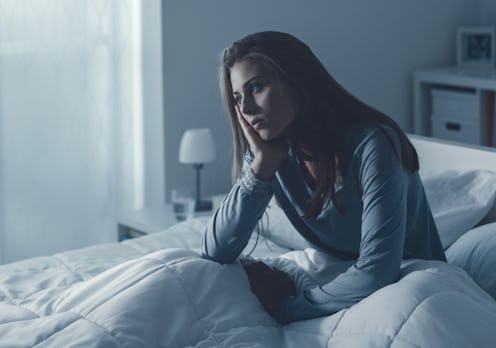Life
7 Freaky Things That Happen To Your Body When You've Lost Just An Hour Of Sleep

While it may not seem like a big deal, losing just one hour of sleep can have some surprising effects on the body, especially if you do so night after night. "The average individual needs 7.5 hours of sleep nightly," Dr. Suzanne Stevens, neurologist sleep specialist with The University of Kansas Health System, tells Bustle. "This means actual sleep, not just time in bed." So if you only get six and a half hours — and then struggle to sleep again the next night — you might not feel so great.
"Losing one hour every single night easily adds up, and leads to sleep debt and sleep deprivation, with both short-term and long-term behavioral and medical consequences," Dr. Roy Raymann, vice president of sleep science and scientific affairs at SleepScore Labs, tells Bustle. But losing just one hour can have an impact, too, sometimes causing grogginess, disorientation, and other strange side effects.
One way to combat these symptoms is to get up and look outside. "Make sure you get plenty of light after you get out of bed," Dr. Raymann says. "It will energize you and counteract the effects of easy wakening and short sleep." Read on for some odd things that can happen if you lose an hour of sleep, according to experts.
1Your Body Will Expect More Sleep
If you're used to getting, say, eight hours of sleep, but end up only snagging seven, it's going to confuse the heck out of your body.
"Your body is still expecting to be allowed to sleep when the alarm clock wakes you up," Dr. Raymann says. "So you might experience some extra grogginess (also called sleep inertia) after waking up because you’re forcing a transition to wake at a time it was not expected."
When you have a predictable sleep schedule, your body gets used to that pattern, and goes through its various sleep stages throughout the night accordingly. If it gets disrupted, for any reason, you will feel groggy when you wake up.
2You Might Be Clumsy
"Waking up one hour before your body is used to [waking] up might cause grogginess. sleepiness, [and] poor motor control," Dr. Raymann says. "You might feel that everything runs at a lower gear and you might even feel disoriented. This feeling will disappear most likely within 30 minutes." And the process can be hurried along by moving around, and getting some sunlight.
3You'll Feel Like You're Moving In Slow Motion
It's also possible you'll feel fatigued throughout the entire following day. "By cutting off an hour, you're really cutting out an hour of 'deep sleep,' which your body and mind desperately need for recovery," Matthew Ross, COO of The Slumber Yard, tells Bustle.
If you can't shake the sleepiness, a quick nap can help. "You should take a short nap near the middle of the day in order to replenish your body," Ross says. "You'll want to make sure the nap isn't longer than 20-25 minutes though. After about 20 minutes, your body will likely start to enter the deeper stages of sleep, which will make it more difficult for you to wake up and get going again."
4You Might Struggle To Sleep For A Week
During daylight saving time, when we set the clocks forward in the spring and thus lose and hour of sleep, you may notice that your entire sleep schedule is thrown off.
"The change to daylight saving time can disrupt your sleep pattern, making it more difficult to get sufficient sleep for up to a week," Dr. Douglas Kirsch, president of the American Academy of Sleep Medicine, tells Bustle.
5Your Performance Levels Might Drop
Daylight saving time can also throw you off your game and impact how well you function, until you get adjusted. "This sleep disruption can impair your productivity, alertness and mood, and it may increase your risk of driving drowsy, especially if you don’t get plenty of sleep during the week leading up to the time change," Dr. Kirsch says.
Since it can have such a profound effect, it's important to be cautious until your sleep schedule goes back to normal. As Dr. Kirsch says, be extra careful when performing activities that require maximum alertness, such as driving, for at least seven days.
6It Can Increase The Risk Of Heart Attack
"On average, Americans lose 40 minutes of sleep when we move the clocks ahead in the spring, but what's really concerning is how this can cause serious disruptions in health," Mike Kisch, co-founder and CEO of Beddr, tells Bustle.
Studies have shown that the sleep deprivation caused by daylight saving time raised the risk of having a heart attack the following Monday by 25 percent, as opposed to other Mondays.
While it's not guaranteed that you'll have such a major side effect, the potential impacts of losing an hour of sleep — especially during daylight saving time — are important to keep in mind.
7You Might Feel Hungrier Than Usual
When you lose an hour of sleep, "your levels of satiety — that feeling of being comfortably full after eating a meal — can also be skewed," Kisch says. So don't be surprised if you're positively ravenous the next day.
This is due, in part, to the hormone ghrelin, which is commonly referred to as the hunger hormone. Lack of sleep can increase the levels of ghrelin in the body, and make you feel hungrier than you normally would.
As Kisch says, "A consistent sleep schedule will combat this, and enable you to stay healthy even with the hour shift." And, no matter the time of year, sticking to a consistent sleep schedule can be a big help, too, so you can get a full and restorative night's sleep.